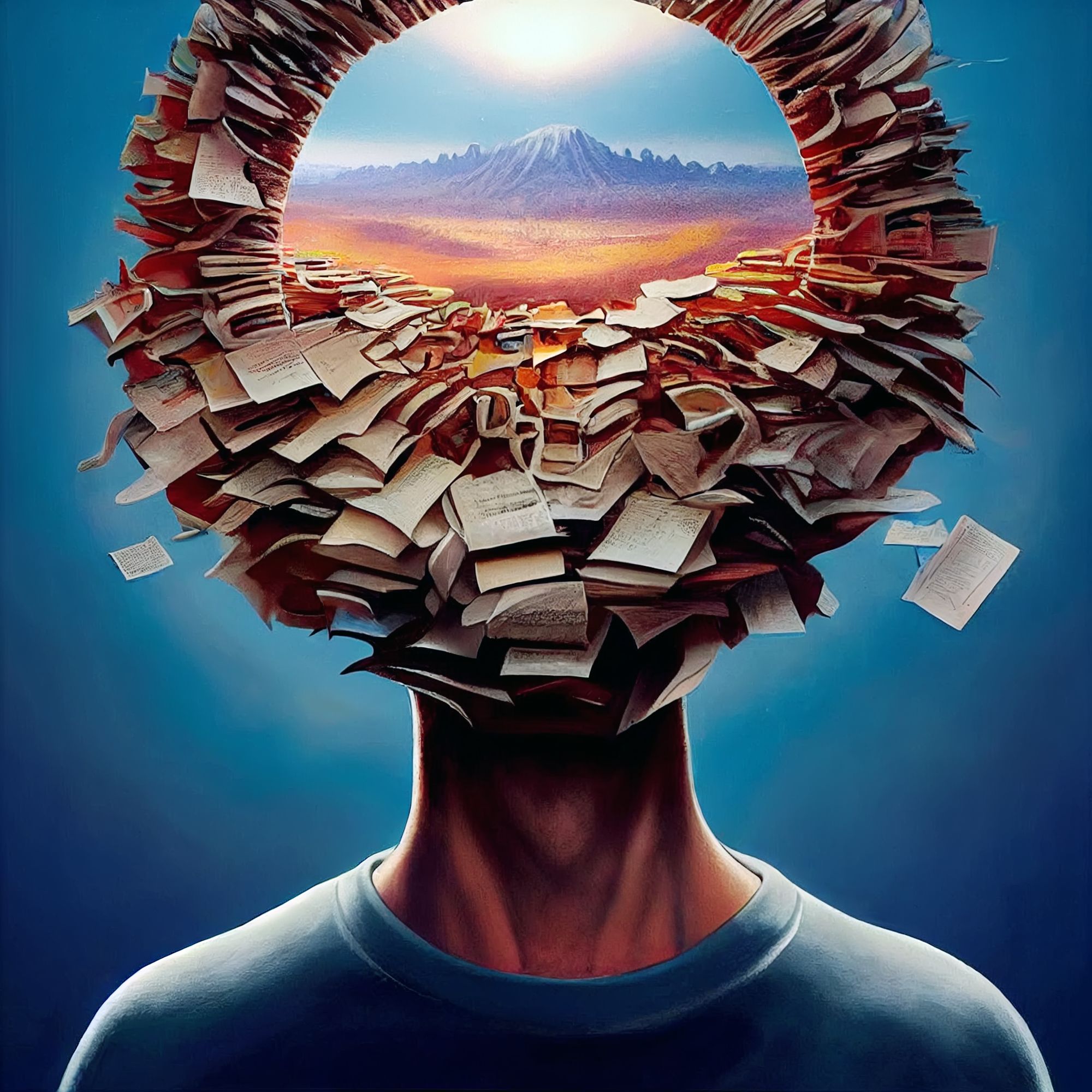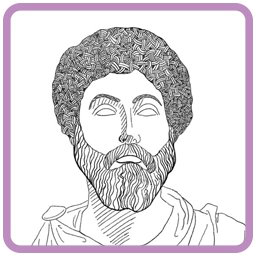This article offers a clear Stoic daily routine, divided into Morning Rituals, Work Rituals, Social Rituals, and Evening Rituals, guiding you on how to practice Stoicism effectively.
By experimenting with these stoicism practices, you can tailor them to your unique needs, fostering personal growth and tranquility.
So many Stoic practices, but where do you begin?
In this article, I provide an example Stoic daily routine that you can start experimenting with today.
To make things simple, I've categorized the day into four broad areas:
I've also created a companion podcast to go with this post. Both the podcast and the article complement each other but they are standalone pieces in themselves.
When it comes time to put the ideas into practice, I'd strongly recommend you have some fun with them. Don't be overly serious. That's missing the point.
These Stoic practices are for you to experiment with and find what works for you and your unique life situations.
James Clear, in his incredible book Atomic Habits, breaks down the 4 laws of habit formation as follows:
The 2nd Law: Make It Attractive
The 3rd Law: Make It Easy
The 4th Law: Make It Satisfying
It really is worth running a quick mental check on these laws when implementing a new habit if your goal is to stick to it long-term.
If you want to start a meditation practice, for example, you just ask the following questions (I've provided example answers):
Q: How can I make it obvious?
A: Leave a meditation cushion out at the foot of my bed.
Q: How can I make it attractive?
A: Before meditating, remind myself of the benefits of doing it.
Q: How can I make it easy?
A: Meditate for 5 minutes. Increase by 5 minutes each week.
Q: How can I make it satisfying?
A: Track my meditation progress in a habit tracker like lifeofdiscipline.com
Now let's get into the routines and practices.
Morning Rituals
Stoic practices to do when you first wake up
💭 Stoic Quote Contemplation
The following quote by Marcus Aurelius is a good one to start with:
"At dawn, when you have trouble getting out of bed, tell yourself: “I have to go to work — as a human being. What do I have to complain of, if I’m going to do what I was born for — the things I was brought into the world to do? Or is this what I was created for? To huddle under the blankets and stay warm?”
So you were born to feel “nice”? Instead of doing things and experiencing them? Don’t you see the plants, the birds, the ants and spiders and bees going about their individual tasks, putting the world in order, as best they can? And you’re not willing to do your job as a human being? Why aren’t you running to do what your nature demands?
You don’t love yourself enough. Or you’d love your nature too, and what it demands of you."
Reflect on the quote, talk back to Marcus, and set up your intention for the day.
🧘 Morning Journal or Meditation
In this article, I share my morning journal template. Takes only about 5 minutes to do each day, and also a 10-minute guided meditation.

If you want new, daily prompts... Allan, from WhatIsStoicism.com, has created a brilliant Micro Morning Meditation series which he sends via email.
Check that out here.
📚 Deep Read Stoicism (20 Minutes)
“Each day acquire something that will fortify you against poverty, against death, indeed against other misfortunes as well; and after you have run over many thoughts, select one to be thoroughly digested that day. This is my own custom; from the many things which I have read, I claim some one part for myself.”
— Seneca
Read slowly and as if the piece was written about you, and then settle on one idea from the book that you will think about throughout the day. Make a note of this idea.
Here is the library of my posts I you want to start here:

🥶 Cold Shower Meditation
“Practice yourself, for heaven's sake, in little things, and thence proceed to greater.”
— Epictetus
Put the water on cold in the shower, take 10 deep breaths, and set a timer for 10 minutes. Now enter into the cold water. After a week of this, you will start to look forward to these cold showers.
Cold exposure is a great tool because it is unpleasant but good for us. This trains our discipline to take on more difficult tasks in other areas of life.
If you're skeptical of the benefits of cold exposure, here's a solid science-based overview:
💀 Mirror Death Contemplation (2 Minutes)
"Alone in his room, as he listens to the sound of his own wheezing, he doesn’t feel much like an emperor anymore—just a feeble old man, sick and dying. He turns his head to one side and catches a glimpse of his reflection on the polished surface of the goddess Fortuna’s golden statuette by his bedside. His Stoic tutors advised him to practice a mental exercise when he noticed his own image. It’s a way of building emotional resilience by training yourself to come to terms with your own mortality. Focusing his eyes weakly on his reflection, he tries to imagine one of the long-dead Roman emperors who preceded him gazing back. First he pictures Antoninus, his adoptive father, and then his adoptive grandfather, the emperor Hadrian. He even imagines his reflection slowly assuming the features depicted in paintings and sculptures of Augustus, who founded the empire two centuries earlier. As he does so, Marcus silently asks himself, “Where are they now?” and whispers the answer: 'Nowhere . . . or at least nowhere of which we can speak.'"
— Donald Robertson, How to Think Like a Roman Emperor
Look into your face in the mirror and contemplate your ancestors who came before you. They too looked into a mirror, now they are not here. Imagine the old version of you looking back at yourself. Realize that death will come for you as it has for everyone else.
If you want to experiment with a guided death meditation, you can do so here:
👖Dress to (Not) Impress (5 Minutes)
“Set aside a certain number of days, during which you shall be content with the scantiest and cheapest fare, with course and rough dress, saying to yourself the while: ‘Is this the condition that I feared?’”
— Seneca
Where possible, wear the clothes you’d wear even if you were spending the day on your own. Dress for yourself. Do not wear uncomfortable clothing just because it looks good. Dress in simple clothes.
Work Rituals
How to practice Stoicism at work
🧭 Pre-Work Contemplation
“If one does not know to which port one is sailing, no wind is favorable.”
— Seneca
Before you begin work, clear your mind for a few moments and create an intention for work. Make this intention internal, and based on an area you can improve.
Think of this as a performance statement.
Example:
“Every time I get distracted, I will make a note of the distraction, then return my attention to the task at hand.”
Before you begin work, get clear on this intention and imagine yourself using it during work.
🔨 Doing The Work
“If you seek tranquility, do less. Or (more accurately) do what’s essential. Do less, better. Because most of what we do or say is not essential. If you can eliminate it, you’ll have more tranquility. But to eliminate the necessary actions, we need to eliminate unnecessary assumptions as well.”
— Marcus Aurelius, Book 4, Meditations.
Whatever you do at work, do it with complete care and attention. If you serve coffee, work as if the coffeehouse belongs to you. Try to put love and warmth into every action. Focus only on the tasks that matter most. Every time you feel resistance go into it.
⚡️ Remaining Focused
When you find yourself getting distracted, take a few breaths and recite your intention from your pre-work contemplation.
Say it with meaning. One of the coolest things about life is that each moment presents us with the opportunity to start again. There is an incredible power to this idea. Begin again. Feel free to use visualization exercises too.
One I particularly like is called “Taking Souls” by David Goggins. You aim to work so focused and hard that you “take the souls” of those who watch. This is a fun description, of course, not a morbid one.
For example, if you work as a bricklayer. When you go to work you do such a good, efficient job, all the other brick layers and work people are shocked and feel like underperformers in comparison. This is a visualization for your benefit, in the end, what matters most is your own intention and opinion of yourself.
🤝 Working With People
“Begin each day by telling yourself: Today I shall be meeting with interference, ingratitude, insolence, disloyalty, ill-will, and selfishness – all of them due to the offenders’ ignorance of what is good or evil. But for my part I have long perceived the nature of good and its nobility, the nature of evil and its meanness, and also the nature of the culprit himself, who is my brother (not in the physical sense, but as a fellow creature similarly endowed with reason and a share of the divine); therefore none of those things can injure me, for nobody can implicate me in what is degrading. Neither can I be angry with my brother or fall foul of him; for he and I were born to work together, like a man’s two hands, feet or eyelids, or the upper and lower rows of his teeth. To obstruct each other is against Nature’s law – and what is irritation or aversion but a form of obstruction.”
— Marcus Aurelius
Before you work with anyone, keep a realistic perspective as Marcus Aurelius did. You will meet with people who rub you the wrong way.
This is an unavoidable part of life. Even so, try to practice talking with everyone you encounter with empathy, assertiveness, and respect (EAR). If you encounter difficult people, see it as a great opportunity to practice virtue.
If you get insulted, look for some truth in what they say and zoom in on this. If you cannot do this, your ego is controlling you. If you genuinely try but cannot find any truth, why get upset?
Learn more about good communication here:
📝 Post-Work Reflection
Now that your work is complete, think of three things you did well and feel genuinely happy with yourself as you think about them.
For some reason, we like to get caught up a lot on things we do wrong. But one of the best ways to get better at something is to zoom in on all the things you did well.
This keeps you inspired in the long run. Many faults just autocorrect over time.
Social Rituals
Stoic practices for spending time with friends and family
👋 Greetings — A New Beginning
“People were made for one another. So either instruct them or put up with them.”
— Marcus Aurelius
In our relationships with family, in every interaction, we can find all previous experiences with said person folded into it.
Have you ever found that with some people you are walking on thin ice? One wrong word or action and either you or they get triggered and an argument ensues. Of course, this argument didn’t really start today. It may have started months or even years ago.
Is this wise? Is this way of showing up in your relationships going to help them? When you greet family members, try to let go of the past and start today as a new day, a new relationship with them.
As Marcus said, we should instruct people we have issues with or put up with them. Complaining and being passive-aggressive is futile if you desire tranquility.
Every day is an opportunity to start a new relationship with anyone you choose.
🗣️The Student Sage — Learning From Others
1. From my grandfather Verus I learned good morals and the government of my temper.
2. From the reputation and remembrance of my father, modesty and a manly character.
3. From my mother, piety and beneficence, and abstinence, not only from evil deeds, but even from evil thoughts; and further, simplicity in my way of living, far removed from the habits of the rich.
4. From my great-grandfather, not to have frequented public schools, and to have good teachers at home, and to know that on such things a man should spend liberally.
— Marcus Aurelius
Even though Marcus Aurelius was the Emperor of Rome and a masterful Stoic, he would still attend Stoicism lectures into middle age.
He saw himself as a lifelong student of Stoicism and wisdom in general. In the opening to Meditations he lists the things he learned from family members. How beautiful is this? Many of us like to complain about the traits of our closest family members and friends, but Marcus so each person he met as a mentor, possessing magical traits which he would do well to take.
With your own family, always be on the lookout for what they can teach you, and make a note of things in their words or actions that you respect.
You will be shocked at how much better your relationships become with people when you take the frame of “What can I learn from this person” vs. “What can I teach this person.”
🌙 Goodbye — Memento Mori
“As you kiss your son good night, whisper to yourself, “He may be dead in the morning.”
— Epictetus
Whenever you leave a family member, remember that our time here is limited and precious. You or they may not be around in a year from now. They may not even be around tomorrow.
Evening Rituals
Stoic practices for the end of the day
✍️ Write a Self-Improvement Book to Yourself
Here, instead of reading another person’s book, write a book to yourself. This is what Marcus Aurelius intended with his book Meditations.
This book was never meant to be published. Marcus wrote advice to himself. This is an amazing concept. You already know so much. You already know how you should behave and how you should not behave. Write about it.
🤸🏻♀️Yoga (Or Different Physical Activity)
“Yoga has improved my balance and flexibility, reminded me of the importance of play, and made me acutely aware of how little control I have over the contents of my mind. But besides conferring these and other benefits on me, yoga has been a wonderful source of voluntary discomfort. While doing yoga, I twist myself into poses that are uncomfortable or that in some cases border on being painful. I will, for example, bend my legs until they are at the very edge of a cramp and then back off a bit. My yoga teacher, though, never talks about pain; instead, she talks about poses giving rise to “too much sensation.” She has taught me how to “breath into” the place that hurts, which of course is physiologically impossible if what I am experiencing is, say, a leg cramp. And yet, the technique undeniably works.”
— William B. Irvine, A Guide to the Good Life: The Ancient Art of Stoic Joy
Socrates encouraged his students to stay both physically and mentally fit.
Yoga is a fantastic exercise that can increase mindfulness, flexibility, and strength. It can be done anywhere, for free, and it is also a great practice for voluntary discomfort. If you have had an active day, do simple stretching yoga.
If you have had a sedentary day, do a slightly more intense yoga flow.
🛏️ Evening Meditation–Reflecting on Day
One of the best ways to level up your practical wisdom is to analyze your behavior each day. You can do this in journal form or in a mental contemplation.
Simply ask yourself the following questions:
- What did I do well?
- What did I do not so well?
- What should I do differently tomorrow and moving forward?
The most important one is what you're going to do differently, so really try and make a plan to implement your desired new behaviors.
Below you'll find some deeper resources on how to reflect at the end of the day.


Quick-Start Checklist
Here are 8 daily Stoic practices to jumpstart your journey:
- Read a Stoic quote upon waking to set your mindset.
- Journal or meditate in the morning for clarity.
- Read Stoic texts for 20 minutes to deepen understanding.
- Take a cold shower to strengthen discipline.
- Reflect on mortality in the mirror for perspective.
- Set a work intention and pursue it fully.
- Engage others with empathy and respect.
- Review your day at night to plan improvements.
FAQs
- What are some simple Stoic practices for beginners?
Simple practices include reading Stoic quotes, journaling, meditating, and reflecting daily. - How can I practice Stoicism in my daily routine?
Start with morning quote contemplation, set work intentions, practice empathy socially, and reflect at night. - What are the benefits of Stoicism practice?
It boosts resilience, improves decision-making, and cultivates inner peace.

